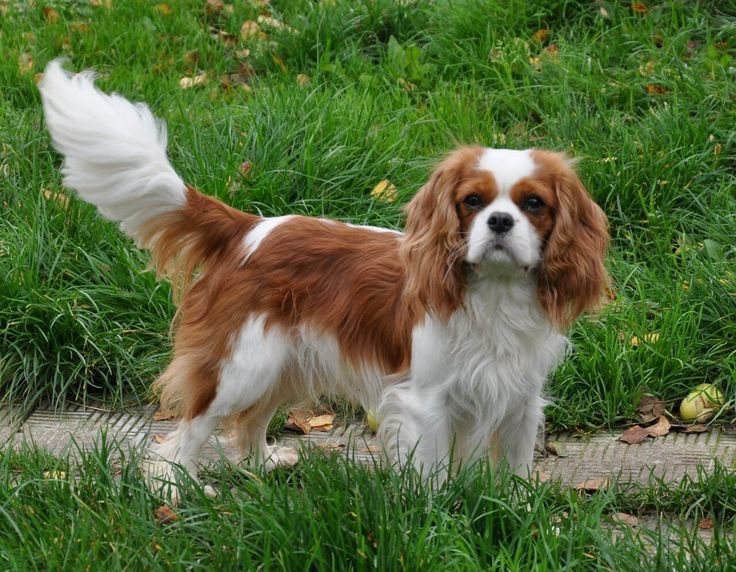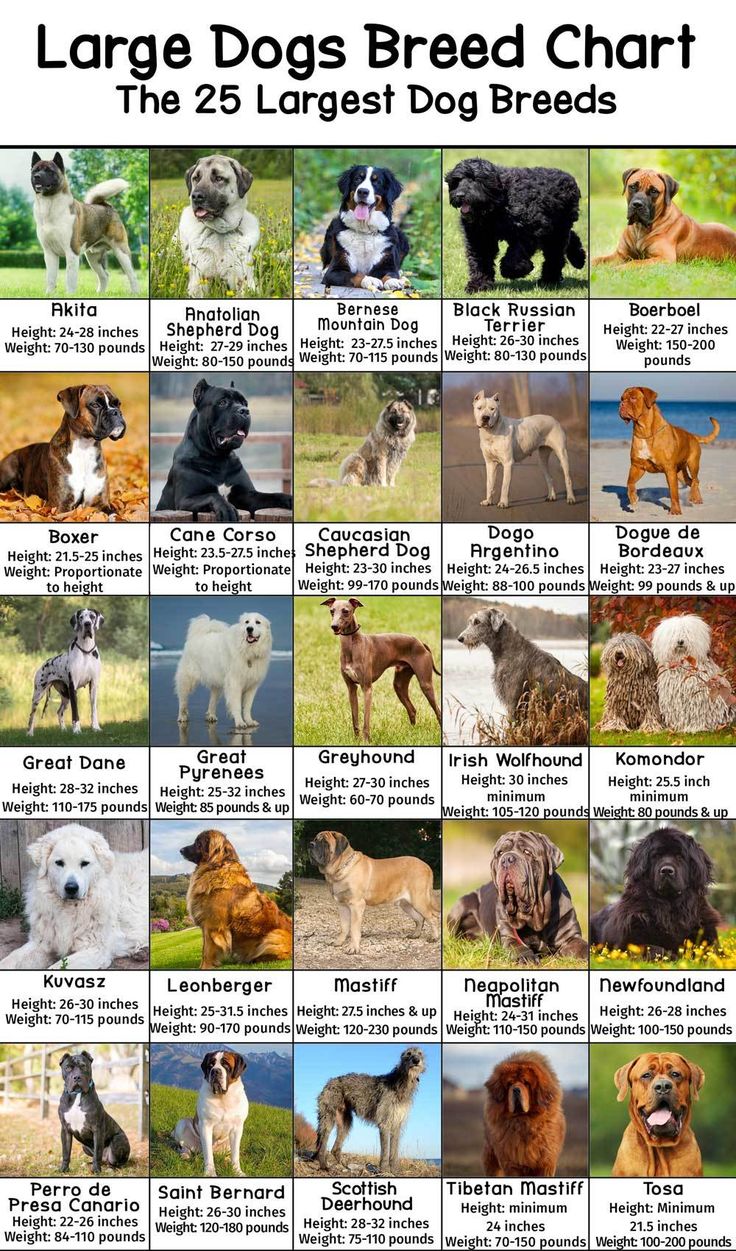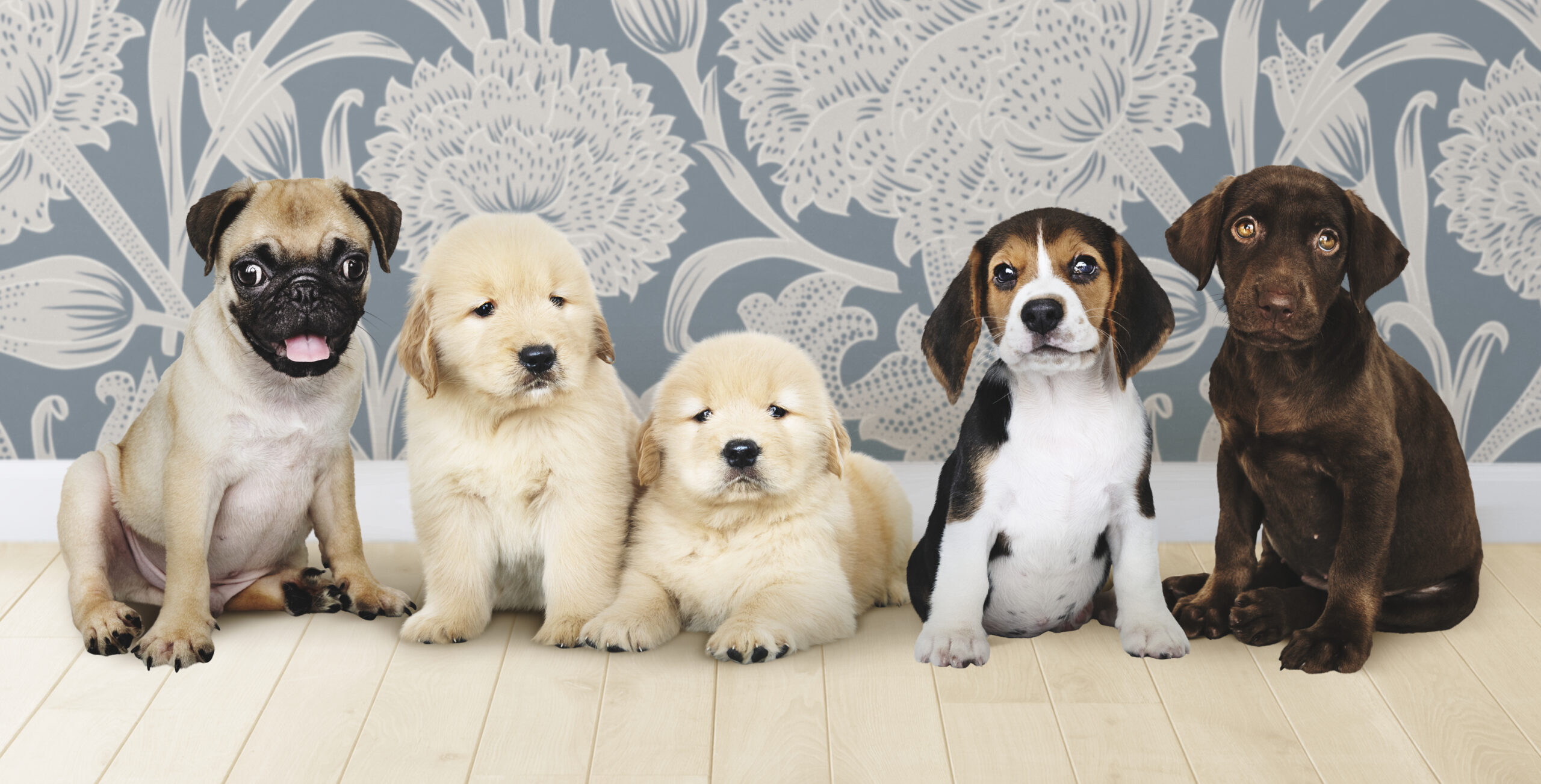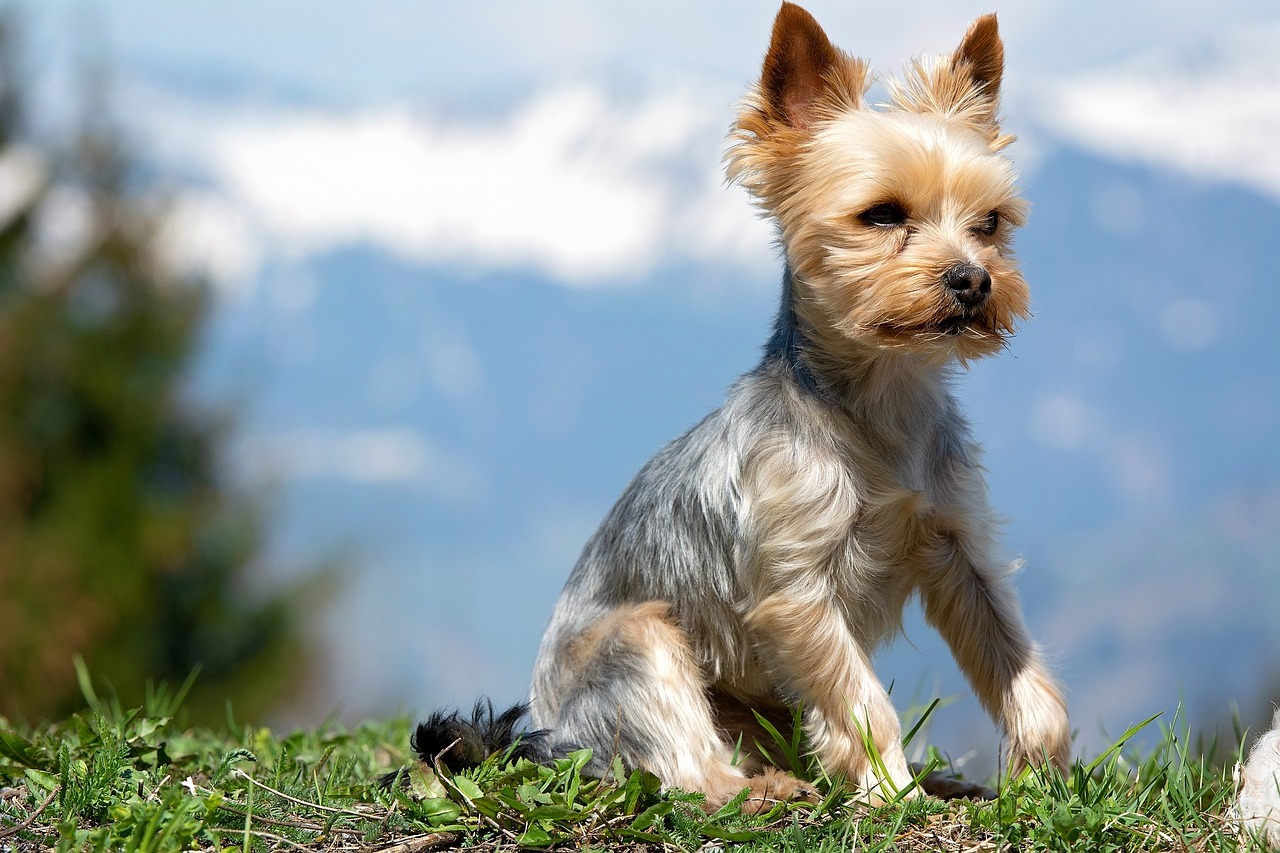Tinny Cavalier King Charles Spaniel is the most popular dog breed in the world due to its adaptability and friendly nature. Read all about this beautiful breed.
- Statistics
- Cavalier King Charles Spaniel
- Adaptability
- Quick Facts
- Cavalier King Charles Spaniel Size
- Temperament
- Personality
- History of Cavalier King Charles Spaniel
- Cavalier King Charles Spaniel Breed Characteristics
- Cavalier King Charles Spaniel Care Needs
- Training & Exercise
- Diet & Nutrition
- Health Issues
- Conclusion
- FAQs
Statistics
| Breed Group | Toy Group |
| Height | 12-13 inches |
| Weight | 13-18 pounds |
| Life Expectancy | 12-15 years |
Cavalier King Charles Spaniel
One of the most cherished dog breeds is the Cavalier King Charles Spaniel which has an endearing, friendly, and gentle disposition. Due to their small stature, high adaptability, and moderate energy levels, they make ideal companions who can live in any environment as long as you take care of them properly in terms of training or keeping them close to you. If you care for a Cavalier King Charles Spaniel with sufficient love, attention, and training they will be there for you through thick and thin providing endless companionship and happiness for years on end. As such, this particular breed may bring such delight to first-time dog owners or experienced ones alike even during tough times during our lives.
Poised like a King, The Cavalier King Charles Spaniel possesses deep affection for its bond towards its owner- most notable for its appearance associated with the social elite (calls) but not restrictively. Born to serve rich people’s houses all around Europe, this dog is recognizable for his elegance as well as loveable disposition. The breed has a fascinating past, and delightful character traits, and it can fit into different types of lifestyle or take part in various kinds of exercises. So let us comprehensively examine the dog known as the Cavalier King Charles Spaniel including its origin, features, grooming requirements, and training guidelines.
Adaptability
A Cavalier King Charles Spaniel is a pet that can adjust to almost any environment which makes it among the most favored pets by many people. This dog breed is adaptable to any living environment, whether it’s an urban apartment or a farmhouse.
- Living Conditions: The Cavaliers adapted for rural and urban living equally smoothly. They don’t need much space at all, but if there’s a yard outside then they’d love to play in it. Daily walks and game sessions provide enough exercise in cities.
- Climate Tolerance: While Cavalier King Charles Spaniels can adapt to different climatic zones, they thrive better within a moderated temperature range. During extreme weather, they may need special attention, such as protective clothing in wintertime or a shady refuge during hot months.
- Social Adaptability: They want to have friends around, so they dislike being left alone for long hours. These are friendly dogs who want to be around people and take part in everyday errands.
Quick Facts
- Origin: United Kingdom
- Colors: Blenheim (chestnut and white), Tricolor (black, white, and tan), Ruby (solid red), and Black and Tan
- Temperament: Affectionate, gentle, adaptable, sociable
- Coat Type: Silky, medium-length, with feathering on the ears, chest, legs, and tail
- Exercise Needs: Moderate
- Grooming Needs: Moderate to high
- Good with Children: Yes
- Good with Other Pets: Yes
- Family-Friendly Dog Breed: Families can get to enjoy Cavaliers because they are good around children and co-exist well with other pets. Children tend to play with these dogs since they are soft while still managing to avoid hurting them or making them feel uncomfortable in any way possible. Besides that, families also have the chance to keep other animals together with their Cavaliers.
Cavalier King Charles Spaniel Size
Cavalier King Charles Spaniels are indeed a toy dog breed and suitable for individuals who prefer an accommodating four-legged friend. However, they are not just pet-made hulks as these pups have incredible physiques. A typical Cavalier usually measures from 12 to about 13 inches at the shoulder range.
Weight-wise they vary from 13 to 18 pounds depending on their body build and how much they engage in physical activities. This breed has a well-proportioned body with strong bones, creating a balanced and sturdy physique. Everything here acts like some kind of equilibrium promoting both powerlessness and relentless speed.
Temperament
The temperament of the Cavalier King Charles Spaniel is one of the most charming features of this breed. These pooches are known for their calmness, friendliness, and tenderness which make them pleasing companions. They have a strong attachment to their owners hence they need to be part of a family system. They love to take part in family activities; hence follow their owners wherever they go, wanting to be nearby always. Nevertheless, besides being playful, Cavaliers are also known for being composed and peaceful.
They can comfortably lie down on your couch or run around in your yard but remain calm making them versatile as well as easy-going pets. With an ability to be patient with children and show gentleness towards them, Cavaliers become a good option for families. As a result, there are no excessive movements that can lead to accidents during game sessions with kids involved. This breed gets along well with other dogs and drawings especially if raised together from birth. Their calmness will enable them to peacefully co-exist with other animals within one household without proving a nuisance.
Personality
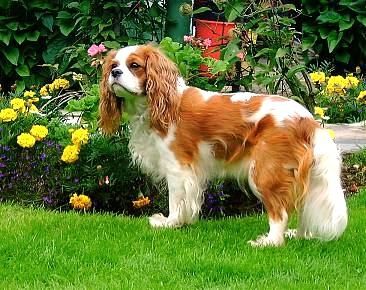
The Cavalier King Charles Spaniel is characterized by its lovable character, which is a combination of love, playfulness, and grace. Their nature could be described as “sweet and gentle”, earning them great appreciation from many people.
- Affectionate: Cavaliers are extremely affectionate and form deep connections with their owners. These dogs find joy in family connections and thrive on human interaction. They often exhibit cuddling and loving behaviors, making them great lap dogs.
- Playful: With some aristocratic lineage, Cavaliers have an amusing side. They enjoy fetching games and toys that require cooperation and socializing with other dogs. This social trait makes them ideal pets for kids and other household animals.
- Sensitive: Apart from listening to their owners’ words, but also hearing the silence that goes along with it. They learn best through gentle positive reinforcement and become frightened if maltreated.
- Sociable: This breed is characterized by friendliness and outgoing nature. They are good at welcoming strangers or other pets, making them ideal for homes with many friends. They lack aggressiveness; their gentleness makes them perfect companions for families having babies or older ones.
History of Cavalier King Charles Spaniel
In royal courts and with noblemen who were both great in spirit, was born the Cavalier King Charles Spaniel. This breed can be traced back to the sixteenth century when it was then a favorite of European aristocrats primarily in England. These cavaliers were companions for aristocrats during their reigns. Among them were King Charles I and Charles II who were his sons as well as being named after him; thus, giving the black-and-tan breed its name. It was common for these dogs to appear in paintings along with their monarchs as signs of status and prestige (taking into account that dogs have always been associated with power).
The toy spaniels of Tudor times evolved into this breed through many years of history. By the nineteenth century, however, its original form had disappeared and was replaced by shorter-nosed toy spaniels which weighed more. In the 1920s, there were attempts made at recreating what was then referred to as “old type” Spaniels that would eventually result in the development of what is now known as modern-day Cavalier King Charles Spaniels (English toy Spaniel). The English finalized their registrations for this breed in 1945 with AKC embracing its pedigree in 1995. No toy dog in the modern world can compare in popularity with Cavaliers anywhere
Cavalier King Charles Spaniel Breed Characteristics
The Cavalier King Charles Spaniel is a small dog breed that has a great heart. It is no wonder that these dogs are often seen as favorite pets by dog lovers because of their beautiful eyes, silky fur, and friendly character. Some features of this breed are:
- Affectionate Nature: The Cavalier can be an unenviable partner for some people. They dislike solitude hence they need to be surrounded by humans all the time. It is these attributes that make them affectionately referred to as “velcro dogs”.
- Adaptability: Cavaliers are adaptable animals that can live harmoniously in either a busy metropolis flat or an expansive rural house.
- Sociability: This type of dog usually displays friendly behavior towards strangers, kids, and other animals in the neighborhood. It often behaves in an outgoing manner since it does not possess shyness characteristics making it suitable for companionship both to individuals as well as families.
- Moderate Activity Level: Cavaliers are also happy to snuggle up with their owners on the couch, after playing or taking walks. This means they can be found in both very busy houses, but also more calm ones.
- Intelligence and Trainability: They are usually less difficult to train because they possess intelligence and desire for approval. They can respond positively to techniques centered on encouragement and good motivation.
Cavalier King Charles Spaniel Care Needs

Concerning the cavalier King Charles spaniel, its owners must focus on grooming practices, physical activities as well as general wellness. To remain in excellent shape and possess a joyful disposition, this breed’s luxurious wavy and silky coat as well as delicate temperament demands constant attention from the owner.
Cavalier King Charles Spaniels possess a smooth, medium-length fur coat that should undergo significant brushing on a scheduled basis otherwise, it will become intertwined with other hairs or form clumps. Consequently, they should be combed at least twice or thrice each seven days while concentrating on regions likely to entangle including the ears, chest region, and feet areas. Equally important; ear cleaning and nail trimming must be routinely done.
These tinny dogs must be bathed according to their needs, but it is usually every 4 – 6 weeks depending on how active they are and the state of their fur. Use a mild dog shampoo that will keep its fur soft and shiny. Cavaliers need good teeth to function normally and therefore should be given the best dental treatment. Brushing their teeth and having them checked regularly helps prevent tartar buildup or any diseases of the gums.
Cavalier’s daily activity requirements do not need to be very demanding as they need minimal playtime or walks. Just about 30 minutes daily walk plus sometimes for playing around is enough to keep them healthy and contented. They like playing games such as fetch or engaging in interactive activities that involve both their body and mind. The Cavaliers are clever dogs who require intellectual challenges. Therefore, they need puzzle toys, training classes, and socializing with people to prevent their minds from becoming dull and bored.
Training & Exercise
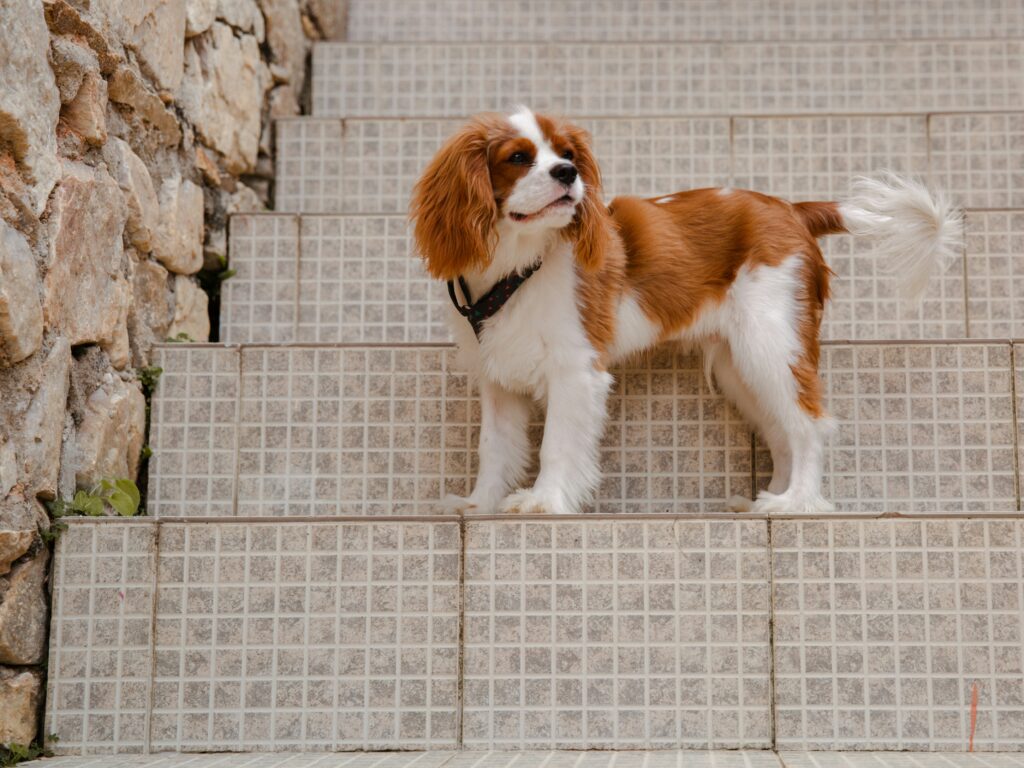
Training a Cavalier King Charles Spaniel can be rewarding due to their intelligence and willingness to please. They respond well to positive reinforcement techniques and enjoy learning new tricks and commands.
- Basic Obedience: Cavaliers learn quickly, so basic obedience training, such as sitting, staying, coming when called, and walking on a leash should be the starting point for their education. This breed particularly benefits from positive reinforcement methods, including rewards (food) and praise.
- Socialization: Early socialization is important to ensure that your Cavalier becomes a well-rounded dog. A confident and sociable adult dog develops through various contacts with different people, environments, and other pets.
- House Training: Generally, Cavaliers are easy house-training dogs but consistency is key here. As a way to crate them in a safe environment while establishing routine behavior patterns as well; crate training may work effectively in this case.
- Exercise Needs: Although Cavaliers are not extremely vigorous dogs, they still need regular exercise for good health maintenance as well as avoiding obesity. Usually, it only takes daily walks alongside some playtime for these little guys (Cavalier King Charles Spaniel) to stay fit. Engagement of the brain happens during activities such as agility training or obedience tournaments which stimulate them both physically and mentally too.
Diet & Nutrition
if they are suffering from certain ailments. Food with proteins, vitamins, minerals, and fats should be eaten since they are important for the body’s growth and functioning. This includes breakfast cereals, fruits, vegetables, and other foods that contain these nutrients to maintain a balanced diet. Given their small size, monitor how much food they consume to prevent becoming overweight. Obesity may cause weight gain leading to heart disease and joint problems among others.
Adjust the portion sizes based on the level of activity or weight. You can use treats when training or rewarding for good behavior but do so only in small amounts so as not to increase your dogs’ caloric intake unnecessarily. Choose healthy low-fat sweeties.
Always allow your Cavalier access to clean drinking water regularly. Keep your dog hydrated while playing outside, especially during hot weather. Preventing dehydration will keep them healthy overall. It is recommended that this type of dog should not eat those kinds of feeds that are low in proteins or contain fewer amino acids than required.
Likewise, sensitive pups with some conditions might need special diets that allow them to manage it better than others who don’t possess hypotheses about it at all we truly look at it nothing will come between us except our individual choices!
Health Issues
The Cavalier King Charles Spaniel is typically a healthy breed, but all breeds have certain health issues of concern. However, a responsible breeder will screen their breeding stock for these disease conditions to keep them as healthy as possible.
- Mitral Valve Disease (MVD): As they grow older, Cavaliers frequently develop MVD, a commonplace cardiac ailment. It is an irrevocable ailment of the heart valves that may result in cardiac breakdown if not correctly handled. Regular visits to the veterinarian are vital for timely diagnosis and management.
- Syringomyelia (SM): This particular medical condition impacts both the brain and spine; thus, leading to various problems such as discomfort and pain. It carries with it several symptoms that need to be recognized at an early stage for effective management including touch sensitivity, neck pains, and lack of coordination among others.
- Hip Dysplasia: Hip dysplasia disease can happen to people who have the cavalier breed but it is not common among small breeds though. This situation affects the hip joint but can lead to arthritis or difficulty in moving when one grows older.
- Eye Conditions: The cavalier King Charles spaniel dogs have a lot of problems with their eyes because they get diseases such as cataracts and retinal dysplasia as well as dry eye syndrome. Early diagnosis and treatment can be facilitated by taking your dog to a vet for regular eye check-ups.
- Patellar Luxation: Such a condition entails the kneecap dislocation and can induce pain or lameness. Surgery might be needed in extreme cases to rectify the problem.
- Episodic Falling Syndrome (EFS): The genetic disorder results in short periods of falling or stiffening muscles, especially during exercise or excitement. Despite its alarming nature, the disease hardly leads to death.
Conclusion
The Cavalier King Charles Spaniel breed is companionship, elegance, and diversity. Their gentle temperament, coupled with their adaptability and small size, makes them suitable for different kinds of homes. Whether you’re looking for a playful friend for your kids as a family, an affectionate partner if you’re single, or an aged person needing a loyal pet that can stay on your lap all day, the Cavalier King Charles Spaniel will surely get you attached to it.
A Cavalier King Charles Spaniel is capable of bringing delight and company into your life for many years when cared for well, checked on its health frequently, and loved properly. Dog lovers across the globe adore this breed because of its amazing history, charming character, and appealing qualities.
FAQs
How often should I take my Cavalier King Charles Spaniel to the vet?
Once a year, a health examination should be done on all dog patients. The puppies require core vaccinations for the first eighteen to twenty-four months of their lives; this includes distemper, parvovirus, and rabies shots. They may require boosters when they grow older.
What are the grooming needs of Cavalier King Charles Spaniels?
Ten-minute daily brushings to prevent knots besides maintaining the shine should be followed. Cutting off the long furs on legs and paws is required when necessary. It is advisable to bathe them once each month except maybe if they are show dogs.
Are Cavalier King Charles Spaniels good family pets?
Thanks to their kind, gentle, and loyal temperament these dogs are often a popular choice for family pets. If they stay alone for some time, they can experience separation anxiety progressing to madness.
How can I prevent common health issues in Cavalier King Charles Spaniels?
Selecting a dog from the kennel club assured breeder bans all their associated risk in order not to contract such diseases but would also be an act of looking for healthy dogs. For example, seeking breeders who will also screen the parents for his or her puppies would ensure that they have improved bloodlines. Studying the health records of both the parents and grandparents may help one to understand how these came about. Furthermore, various health problems can be avoided or controlled through regular veterinary visits, adequate cleanliness, and balanced meals.
